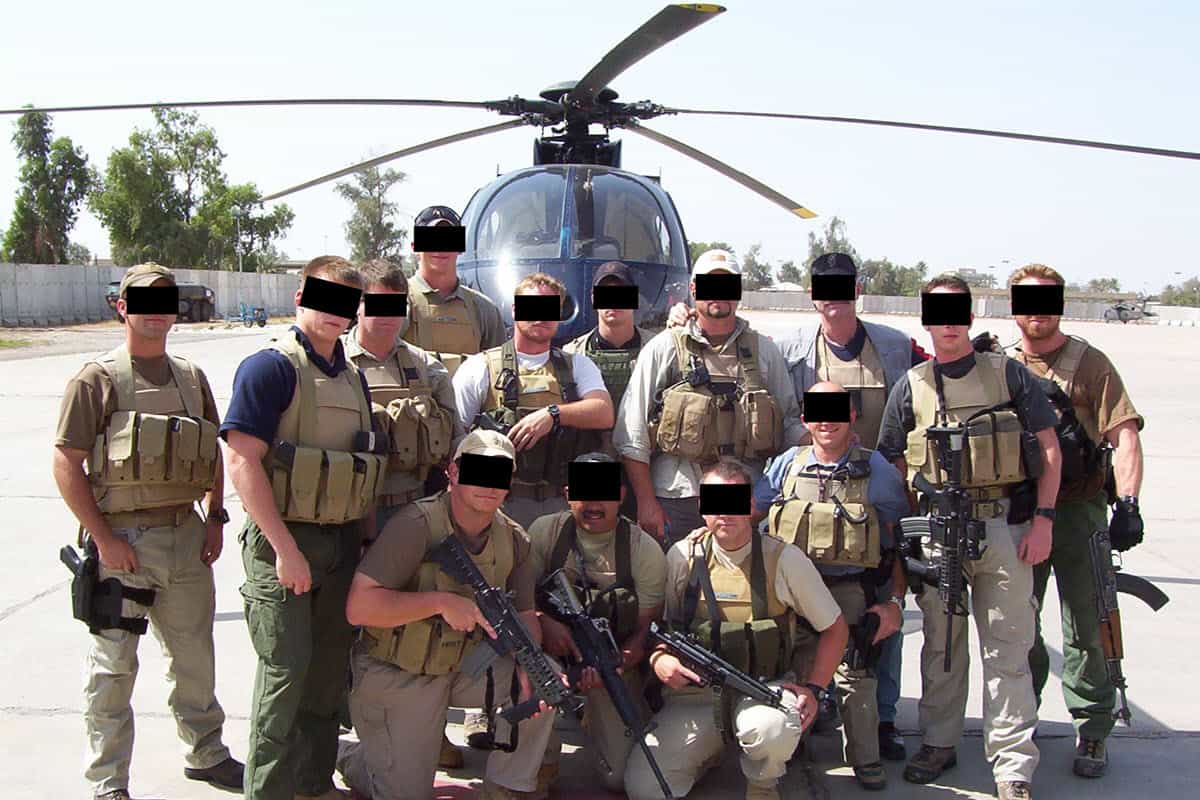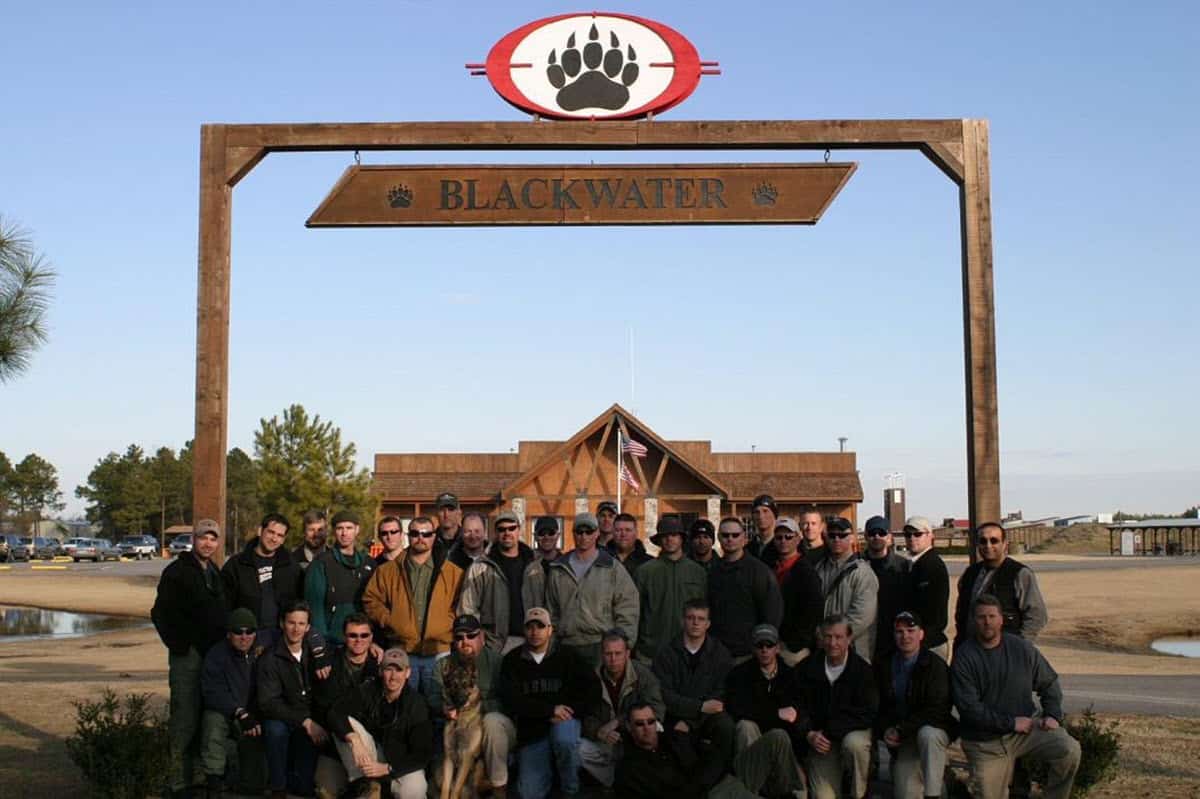Blackwater’s legal and ethical issues are widely known, but how did they get to where they were in the first place? And how did they fare in the aftermath?
The Beginning
Blackwater USA began in 1997 by Al Clark and Erik Prince. They started out as a private security firm providing training support to law enforcement, the justice department, and military organizations and received their first contract from the United States government in 2000 after the bombing of the USS Cole.
In 1998, the private security firm bought a training facility on a dark swamp in North Carolina and officially adopted their name, which was inspired by the murky water surrounding the training facility. The 6,000-acre training facility contained indoor, outdoor, and urban reproduction shooting ranges, an artificial lake, and a driving track.
Government Contracts
During the war in Iraq, Blackwater was one of several private security companies use to guard officials, security guards, and military installations, train the Iraqi army and police forces, and provide other support for armed forces. Their first contact in Iraq was in summer of 2003 when they secured a $21 million contract for Personal Security Detachment and two helicopters for the head of US occupation in Iraq, Paul Bremer.
LISTEN: Stars & Stripes “Force for Hire” Podcast Feature – Soldier turned contractor talks Blackwater training, Iraq mission
In 2004, they were one of three private military companies brought in for protective services in Iraq, Afghanistan, Bosnia, and Israel. This contract brought in $488 million.
They continued to do work for the government back home in the US, too, specifically during the aftermath of Hurricane Katrina. In fact, they sent in a rescue team and a helicopter free of charge to help with relief efforts. During this time, they also moved employees who were already under federal contract into the area to protect government buildings and charged the government $240,000 daily.
Then, in the spring of 2006, Blackwater was one of three companies awarded a contract to provide diplomatic security in Iraq. One of their jobs was to protect the US Embassy there. At this time, because it was a privately owned company, little was known about the internal affairs of the business.
Expansion
Another training facility was acquired in fall of 2006 in Mount Carroll, Illinois, just west of Chicago. Called the Impact Training Center, it’s still in operation and works with law enforcement agencies throughout the Midwestern US. They also attempted to build a facility near San Diego but were met with a lot of resistance from local citizens and government. One of their main concerns was Blackwater’s involvement in the Iraq War. The company eventually withdrew the application for this facility in 2008.

Photo credit (original photo): silentprofessionals.org
Ethical and Legal Concerns
Blackwater’s legal issues are not a secret. They were widely reported at the time.
On September 16, 2007, in Nisour Square, Baghdad, a group of Blackwater contractors tasked with guarding State Department employees opened fire on a small car driven by a couple with their child in tow. Employees claimed they were attacked first while other witnesses say that the contractors opened fire because the car would not get out of the way of the convoy. Iraqi police and other Blackwater forces also got involved in the gunfight. In all, 20 Iraqi civilians were reported killed. The US and Iraqi governments both investigated and their stories about what happened have never agreed.
[UPDATE: On December 22, 2020, President Trump pardoned the four Blackwater contractors involved in the 2007 Nisour Square incident (Nicholas Slatten who was convicted and serving a life sentence for first degree murder; in addition to Paul Slough, Evan Liberty and Dustin Heard who were convicted and serving 12-15 years in prison for manslaughter). In pardoning the former Blackwater contractors, President Trump stated, “these veterans were working in Iraq in 2007 as security contractors responsible for securing the safety of United States personnel.”]
This incident sparked a national interest in the number of private forces being used in Iraq and brought up issues of legality, accountability, and oversight. Questions arose as to whether these contractors have helped or hurt the country’s standing and mission in Iraq and whether the US should be relying on private firms to fight and win wars. In 2007, a census found that there were as many private contractors in Iraq as there were members of the military and that figure is believed to be an underestimate. The major issue: privately contracted security has different goals than the military. Private security is tasked with guarding people or places, not following the government’s plan to win a war.
To be clear, the issues and questions that arose regarding the use of private forces in Iraq and the cost both morally and financially of doing business this way is not limited to Blackwater. There are several firms that were there right alongside them, but the incident that brought all of these questions to the surface was one that involved Blackwater.
But Blackwater did have its fair share of incidents. On Christmas Eve 2006, a drunken Blackwater employee got into an argument with an Iraqi guard and shot him dead. He was quickly evacuated from the country. More shootings of Iraqi citizens were reported in May 2007, which led to an armed standoff. Incidents like this are not rare and, because they’re not military, they don’t face the same consequences, if any at all. This did not sit well with the Iraqis or citizens of the Middle East generally and led to a lot of problems that otherwise could have been avoided.
Blackwater’s response to these incidents was initially to ignore them. They refused any interviews and took their website offline. When they did release a statement, it was brief, targeted for only the US, and stuck to their story that they were initially fired upon by armed enemies.
Moving Forward with the Legacy Company
In 2008, Blackwater announced that it would start to focus its services away from security contracting because of the risks involved. In February 2009, Blackwater changed its name to Xe Services LLC and restructured the company. One of the things it added is an ethics program. The next month, founder and CEO Erik Prince stepped down and in December of that same year, he stopped any involvement in day to day operations.
Xe was bought by a group of investors who built a new company, Academi, and then in 2014 merged with another firm to form Constellis Holdings. They still do business as Academi.
Today, the North Carolina training center operates as United States Training Center, or USTC, and carries out tactics and weapons training for military, government, and law enforcement. They also offer courses in tactical driving, hand to hand combat, and precision rifle marksmanship.
Academi also offers a lot of other services, like maritime training, canine training for explosive and drug detection.
What Happened to Erik Prince After Blackwater?
After the departure of Erik Prince from his former company, Prince stayed active in private military interests around the world.
He was hired by the crown prince of Abu Dhabi and moved to Abu Dhabi in 2010. He founded a new company called Reflex Responses (or R2) that entailed a roughly 800-man unit of foreign fighters for the UAE, where Prince retained a majority 51% ownership.
On a separate front, he oversaw recruitment for private military companies, such as Executive Outcomes which is a former South African private military firm that gained fame when they were hired by several African governments during the 1990s to defeat violent rebellions in addition to protecting oil and diamond reserves.
Then in January 2011, Prince began training ~2,000 Somalis for anti-piracy operations in the Gulf of Aden. This program was funded by several Arab countries, including the United Arab Emirates and was backed by the United States.
Erik Prince currently heads a private equity firm called Frontier Resource Group (FRG) and is chairman of Frontier Services Group Ltd (FSG Ltd), a Bermuda-incorporated logistics and transport company listed on the Hong Kong Stock Exchange. Frontier Services Group is backed by China’s state-owned CITIC Group and Hong Kong-based investor Chun Shun Ko. FSG Ltd advises and supports Chinese investment in oil and gas exploration operations in Africa. Prince had planned to build a diesel refinery in South Sudan but the operation was suspended, even though $10 million (USD) had already been invested in the project.
Erik Prince’s Aviation Ventures
FSG Ltd purchased stakes in two Kenyan aviation companies, Kijipwa Aviation and Phoenix Aviation, to provide logistics services for the country’s oil and gas industry, but later that year in October 2014, the Kenya Civil Aviation Authority denied Kijipwa Aviation an aviation license renewal.
That year, Prince also purchased a 25% stake in Austrian aviation company, Airborne Technologies. He commissioned the company to modify Thrush 510G crop-dusters with surveillance equipment, machine guns, armor, and other weapons, including custom pylons that were capable of mounting either NATO or Russian ballistics. One of the modified crop-dusters was delivered to Salva Kiir Mayardit’s forces in South Sudan shortly before a contract with Frontier Services Group was cancelled. Frontier Services Group owns two of the modified Thrush 510Gs, but since executives learned the craft had been weaponized by Prince, the company has declined to sell or use the aircraft to avoid violating U.S. export controls.
Relationship Between Prince and the Trump Administration
Erik Prince was brought back into the limelight in 2017 when he wrote an op-ed for the Wall Street Journal and suggested that the Trump administration privatize the war in Afghanistan. Prince is also the younger brother of United States Secretary of Education Betsy DeVos, appointed under the Trump administration.
APPLY FOR SECURITY JOBS

